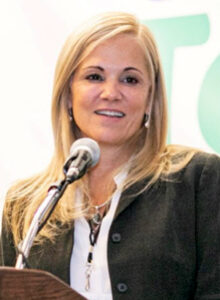The preliminary findings from the national Lifting Voices family/caregiver survey align with and reinforce the Families Together New York State 2025 policy agenda. To find alignment is not surprising given that both the survey and agenda are the creation of caregivers for children and youth with complex social, emotional, mental health, and/or substance use conditions, and both are designed to support success for all children.

Lifting Voices aims to improve children’s mental health care by elevating youth and family stories about their journeys accessing mental health and substance use disorder treatment for a child or youth who has complex needs. The Lifting Voices initiative includes two surveys: one survey for caregivers (of youth of all ages) and the other for youth ages 12-26. The surveys were developed by and for young people and their families to elevate the “lived experience” of youth and the “loved experience” of their families. The surveys gather data about the youth and family experience engaging with the system of care, accessing services, facing barriers, and experiencing the impact of unmet needs. Youth and families also share their recommendations for behavioral health providers, pediatricians, and schools.
Based upon an early glimpse of the responses across multiple states, families indicate:
- Unmet mental health needs are hurting children. Over half (64%) of families report that their child’s life has been threatened by unmet mental health needs, and most (96%) report their child’s education has been negatively impacted.
- Access to Care is Limited. Less than half of respondents report that appropriate mental health care (42%) or substance use care (36%) is available and accessible for their child.
- Stigma is widespread. 68% of families report that stigma has impacted access to care.
- Support is insufficient. Less than half report that schools (34%) or pediatricians (45%) are a source of support.
- Unmet mental health needs are harming families. 96% of families indicate that their own mental health has been negatively impacted by their child’s unmet mental health needs; 84% of families indicate that a sibling’s mental health has been negatively impacted by their child’s unmet mental health needs; and 64% of families report that their marriage has been negatively impacted by their child’s unmet mental health needs.
Families want providers to know that improved care for youth and families is a critical concern. Nearly half (48%) of the Lifting Voices families indicate that the mental health system has caused harm to their child.
One parent survey responder commented:
“Treat children who have mental health issues with the same warmth and kindness that you would have for medical illness. Behaviors are not the problem; they’re the symptom.”
As well, families seek to be actively engaged in the therapy process. Another parent shared in their recommendation for mental health providers:
“Wake up and pay attention… Listen to the families– they know the child best. Spend time with the child and really just actively listen to what is being said.”
Families Together in New York State supports and advocates for youth and families’ voices in policy and systems change to ensure an equitable and inclusive journey that fosters belonging, wellness, and empowerment for all. The NYS Families Together 2025 Policy Agenda was created by families of children and youth with social, emotional, behavioral, and cross-system challenges. The Agenda advocates for coverage parity between commercial and Medicaid insurers to promote access to timely care provided through a robust continuum of mental health and substance use disorder services for all of New York’s children, youth, and families. It also advocates for a 7.8% rate increase for mental health and substance use disorder treatment programs to support efforts to address the state’s workforce shortage, plus additional funding to support the availability of Youth Peer Support.
These priorities amplify an array of opportunities that mental health and substance use treatment providers have to improve the care provided to youth and families in New York State. Certified Community Behavioral Health Clinics have financing support for a full array of evidence-based youth-centered and family-driven care, including care for the entire family and team-based care delivery that integrates Family Peer Advocates and Youth Peer Support. Evidence-based approaches for working with the family as a unit demonstrate better outcomes and treatment completion in fewer sessions (e.g., Berry et al., 2023; Lynch et al., 2022). Family-based care involves addressing change opportunities across all members of the system and not the child or youth alone. Stigma and the erroneous belief that mental health exclusively resides within an individual’s locus of control are barriers to advancement (e.g., Saroca & Sargent, 2022). Family Peer Advocates and Youth Peer Advocates offer vital support to advance recovery and require thoughtful integration throughout the continuum of care.
Families Together NYS provides access to a variety of ongoing technical assistance events and trainings for Family Peer Advocates, supervisors, and Youth Peer Advocates. Families Together also hosts a statewide job board to support recruitment efforts for this critical workforce and shares guidance for starting Youth Advisory Councils to develop services that are truly responsive to youth needs. Additionally, staff at OMH-licensed, child-serving programs can also access free decision support for evidence-based and data informed care delivery to children and youth via the state’s investment in Managing and Adapting Practice (MAP). The Evidence-Based Treatment Dissemination Center (EBTDC) serves as the hub for MAP training and credentialing under NYS OMH. This resource supports providers to identify the “next best action” based on research relevant to a child or youth’s specific needs.
As well, robust school-based access to evidence-based interventions is increasingly available. The Staten Island Borough President’s Office, in partnership with OMH’s Suicide Prevention Center of NYS (SPCNY), has begun to implement one such model, guided by the Staten Island Behavioral Health Blueprint for Staten Island Children and Young Adults. The Blueprint established a north star goal of zero suicides and was developed with extensive community participation from educators, school leadership, treatment providers, mental health staff from community-based organizations, social service agencies, as well as clergy, parents, and youth. In 2025, these efforts led to the MISSION Project (Multi-tier Integrated Supports for Suicide Prevention Implementation and Outcomes in New York), funded by a 5-year SAMHSA Garrett Lee Smith Youth Suicide Prevention grant.
For youth identified to be at the highest risk for crisis (suicide or SUD overdose) and in need of immediate intervention, four of Staten Island’s larger treatment providers have been enlisted to provide access to crisis de-escalation and a specialized intensive outpatient model within 24 to 48 hours. This model combines Collaborative Assessment and Management (CAMS) and Dialectical Behavioral Therapy (DBT), preferably with family participation and support from Family and Youth Peer Advocates. So far, the evidence suggests this approach is a game changer for families and youth. Providers are discovering that not only can hospitalization be avoided, but that after only 5-6 weeks of intensive outpatient therapy, youth are going into remission and potentially avoiding the development of more serious mental health conditions. This model allows youth to remain at school and at home in their community while receiving treatment without the disruption and trauma of the emergency room or hospitalization.
These efforts and innovations are improving the quality of care and advancing access to recovery by actively engaging families and youth. To learn from more families and youth ages 12-26, Families Together in New York State is supporting the dissemination of the Lifting Voices surveys. Both surveys remain open and available. To promote dissemination, just share the link: www.liftingvoices.org or contact the authors to learn how you can brand the surveys to support local community needs assessments, inform service planning, and otherwise advance the movement to improve care access and quality for youth and their families.
Heidi Arthur, LMSW; Ellen Breslin, MPP; and Jennifer Hodgson, PhD, LMFT, are all Principals at Health Management Associates (HMA), and Paige Pierce, BA, is the Chief Executive Officer of Families Together in New York State. The authors are the co-founders of the Lifting Voices initiative, experts in behavioral health care delivery from Health Management Associates, a national healthcare consulting firm, and Families Together in New York State, the statewide advocacy organization for families whose loved ones experience mental health and/or substance use disorders.
References
Berry, K. R., Gliske, K., Schmidt, C., Ballard, J., Killian, M., & Fenkel, C. (2023). The Impact of Family Therapy Participation on Youths and Young Adult Engagement and Retention in a Telehealth Intensive Outpatient Program: Quality Improvement Analysis. JMIR formative research, 7, e45305. https://doi.org/10.2196/45305
Lynch, L., Moorhead, A., Long, M., & Hawthorne-Steele, I. (2023). The role of informal sources of help in young people’s access to, engagement with, and maintenance in professional mental health care—A scoping review. Journal of Child and Family Studies, 32(11), 3350-3365.
Saroca, K., & Sargent, J. (2022). Understanding Families as Essential in Psychiatric Practice. Focus (American Psychiatric Publishing), 20(2), 204–209. https://doi.org/10.1176/appi.focus.20210035







